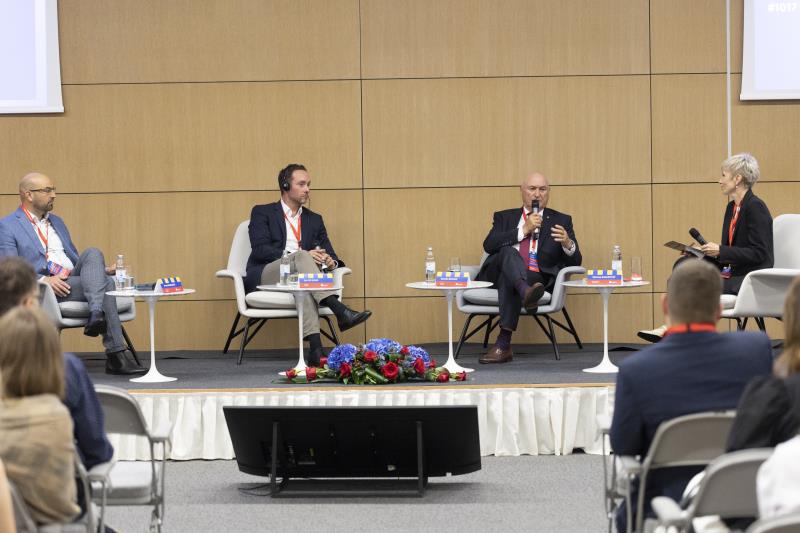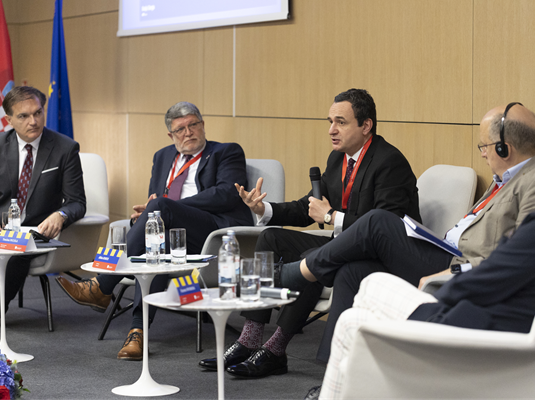Optimism about the future of Croatia as a fully integrated member of the European Union and the courage to seek a more united Europe were the two main messages of the recently concluded conference "European Croatia: Retrospective and Prospective" held in Dubrovnik, organised by Tonino Picula, Croatian Member of the European Parliament, on the occasion of the 10th anniversary of Croatia's membership in the European Union.
The conference was attended by the Prime Minister of Kosovo, Albin Kurti, Paul Vandoren, the last EU ambassador to Croatia before joining EU, prof. Mirko Bilandžić from the Faculty of Philosophy in Zagreb, Sergei Stanishev, vice-president of the European Parliament and former president of the Bulgarian government, Ariana Vela, leading Croatian consultant for EU funds, Tomislav Čorak, partner in the Boston Consulting Group, Christian Pleijel, chairman of the Committee for the Islands of the Nordic Cooperation Council, Dragana Milosavljević from the certification company Biotechnicon, prof. dr. Josip Tica from the Faculty of Economics in Zagreb, Andrius Kubilius, shadow rapporteur for EU enlargement and former Lithuanian Prime Minister, Hannes Swoboda, the last EP rapporteur for Croatia, Branko Roglić, president of the Orbico Group Management Board, prof. Sven Marcelić from the Faculty of Philosophy in Zadar and Jan de Jong, president of the Croatian Association of Digital Nomads.
The participants of the five held panels share the optimistic belief that Croatia in the EU will continue to develop, that it will achieve its goals in the advancement of the well-being of all its citizens, respect for human and minority rights, environmental protection and a successful transition to sustainable energy independence. In addition, they made a bold request that the European Union revive its strength, that it mark the third decade of the 21st century as a smart, peace-making force that can resolve major conflicts, such as the war in Ukraine, and that with its next enlargement, it will finally bring permanent European peace and prosperity to all to their peoples.
Below we also present summaries of the held panel discussions.
At the first panel of the conference called "Retrospective of 10 years of the Republic of Croatia and the EU - Can we do better?" the participants were Paul Vandoren, the last EU ambassador in Croatia before joining, prof. Mirko Bilandžić from the Faculty of Philosophy in Zagreb, Sergej Stanišev, vice president of the European Parliament and former president of the Bulgarian government, Ariana Vela, leading Croatian consultant for EU funds and Tonino Picula. Picula pointed out that Croatia had one of the most difficult negotiation processes in joining the Union, and it was hampered both by the conditions and the inherited weakness of institutions, which was not easy to overcome due to the war and the lack of democratic development in the nineties. He assessed that the question is whether Croatia would have entered the EU after 2013, if it had not then, due to the increasingly complex geopolitical situation. Vandoren replied and confirmed Picula's remarks, but he also revealed that a year and a half before Croatia's accession to membership, a consensus was reached at the level of the Commission and all member states that Croatia deserved to join, and that no additional conditions should be placed before Croatia. He also pointed out that Croatia has largely done a good job, because in many respects it does not differ from other, older member states. After ten years of membership, Croatia looks impressive because it has done a great job: it entered the Union, and now it has entered both the euro area and the Schengen zone, Stanišev said. Speaking about the low level of trust of Croatian citizens in domestic institutions compared to European ones, Picula pointed out that it is not enough to withdraw funds from the EU, it is also necessary to withdraw institutional practices and values, because the EU is not only funds, but also clear rules of the game and legal frame. Ariana Vela assessed that in 10 years of membership we have learned a lot about EU funds and improved the system, but we still have an extremely long process of learning and simplifying the procedures for using the funds. When discussing the forthcoming challenges, the members of the panel unanimously acknowledged that Croatia faces a substantial task of further fortifying its institutions. Additionally, they emphasised the crucial endeavour of advocating for the restoration of the welfare state in both Croatia and the European Union. This course of action is deemed indispensable for alleviating the social pressure arising from the profound changes that lie ahead. These changes encompass various aspects, ranging from mitigating the consequences of climate change and transitioning to new industries and forms of employment, to addressing significant security risks such as warfare and migration.
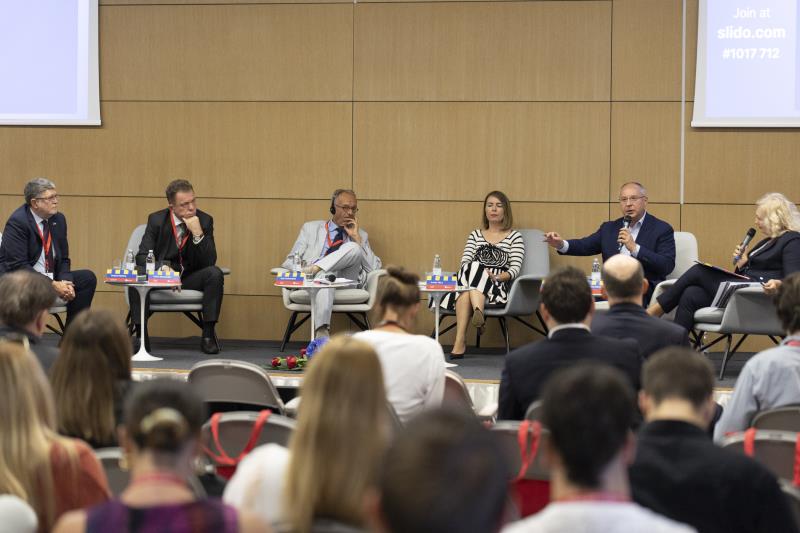
The European Union still has no alternative but to import a portion of its energy, as it is part of its historical legacy. However, the new technologies that we will adopt during the green energy transition will enable us, both in the EU and Croatia, to reduce our dependence on energy imports. This was the message conveyed by participants in the first panel discussion on the second day of the conference "European Croatia: Retrospective and Prospective," organised by the Office of Representative Tonino Picula. The panel discussion, titled "The Green Future of Europe: Between Ambitions and Reality," featured Tomislav Čorak, a partner at Boston Consulting Group, Christian Pleijel, the president of the Committee for Islands of the Nordic Council of Cooperation, Dragana Milosavljević from the certification company Biotechnicon, and Prof. Dr. Josip Tica from the Faculty of Economics in Zagreb. The energy transition of the European Union is not a process where all member states will have the same tools; they depend on historical legacies. Therefore, it is not expected that a country like France, with significant nuclear capacities, or Germany, which has relinquished them, will go through the transition in the same way. There is a great opportunity for Croatia, as Čorak and Tica agreed, particularly for the state-owned power company HEP to assume a leadership position in the transition. HEP should help facilitate the involvement of new large producers and citizens, through citizen energy initiatives, in energy production to reduce dependency on imports. Čorak highlighted the need for HEP to modernise its system to accommodate a large number of new users who, after this major energy price crisis, want to have their own production and participate in the system. Additionally, it is crucial for the European Union to simplify the procedures for co-financing energy transition projects, as the United States managed to outpace the EU in incentives for green transition through its recent Inflation Reduction Act. Pleijel, who hails from Finland and is an islander himself, emphasised the enormous potential of wind farms in the European Union. He mentioned the significant energy demand challenge faced by Croatian islands, particularly highlighting the island of Hvar, where there are as many as 64 tourists per resident during the tourist season. This is why the establishment of the European Island Energy Forum by Picula and the financing of energy transition projects on islands are of crucial importance for the future sustainability of island life. Croatian islands have become pioneers in energy transition on islands by utilising funds for these projects.
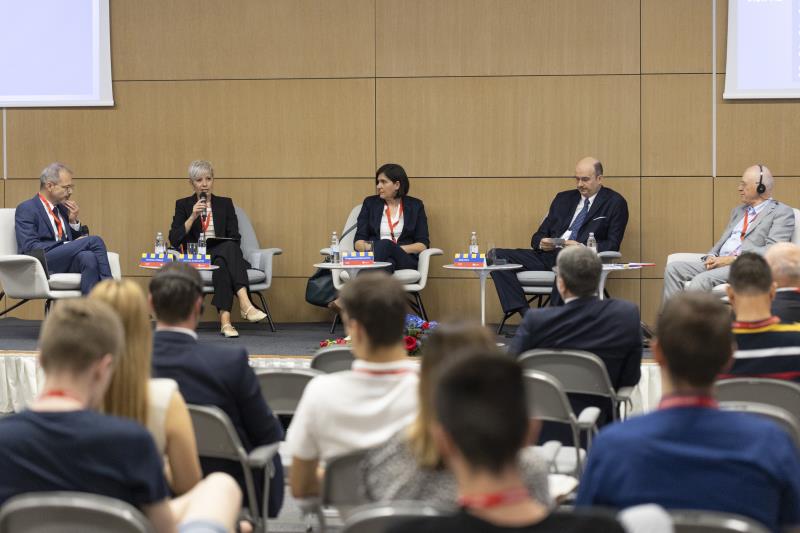
In order to overcome the current geopolitical challenges, the European Union must continue to expand, as this is its strongest foreign policy tool, agreed Andrius Kubilius, shadow rapporteur for EU expansion and former Lithuanian Prime Minister, Hannes Swoboda, last EP rapporteur for Croatia, Tonino Picula , as well as the Prime Minister of the Republic of Kosovo, Albin Kurti, who recently submitted a candidacy for EU membership on behalf of his country. Kubilius introduced the panel entitled "On the borders of Europe: Croatia and expansion policy" by reminding that the recent adoption of Picula's report with recommendations for expansion showed that there is a strong message for expansion in the EU. He assessed how the EU somehow left Ukraine in the lurch by not reacting to the Russian annexation of Crimea back in 2014, so we left it on a platter to Russia. We must not repeat the same mistake with the Western Balkans, he warned. Prime Minister Kurti pointed out that in Kosovo the support for EU membership is as high as 94 percent and that in the past few years, along with the significant growth of the economy, great progress has been achieved in the rule of law, freedom of the media and transparency. There is no better place for the development of the economy, the rule of law and human rights than the EU, and that is why the confidence of the citizens of Kosovo in the European future is high. He assessed that the European Union has the capacity for expansion at a time when it is solving internal crises on its own. He said that the EU will certainly be successful if it returns to its initial settings and becomes more social. Picula also opened the topic of consensual decision-making in the EU, that is, the gradual abolition of the right of veto on some issues, such as security, so that the Union could progress and continue to develop. Swoboda and Kubilius agreed that it is a tool now overused for blackmail by Union members who now have leaders with authoritarian tendencies. Kubilius reminded that the European Community, from which the EU grew, was created as a response to the crisis, and after the crisis was overcome, it remained a successful community and that this must be a message and a reason for optimism in the expansion. Kurti also pointed out that he does not believe in illiberal democracies as a concept, because there is no democracy without the rule of law and respect for human rights, which is why he believes that EU members who do not respect its values should not have access to European money. Picula said at the end of the panel that Euroscepticism should be fought by constant conversation with sceptics, because this is the right way to bring those doubters closer to the benefits they have from the Union, which they might not be aware of. Swoboda, on the other hand, concluded that the Union will expand until it encompasses the whole of Europe, or it will fall apart.
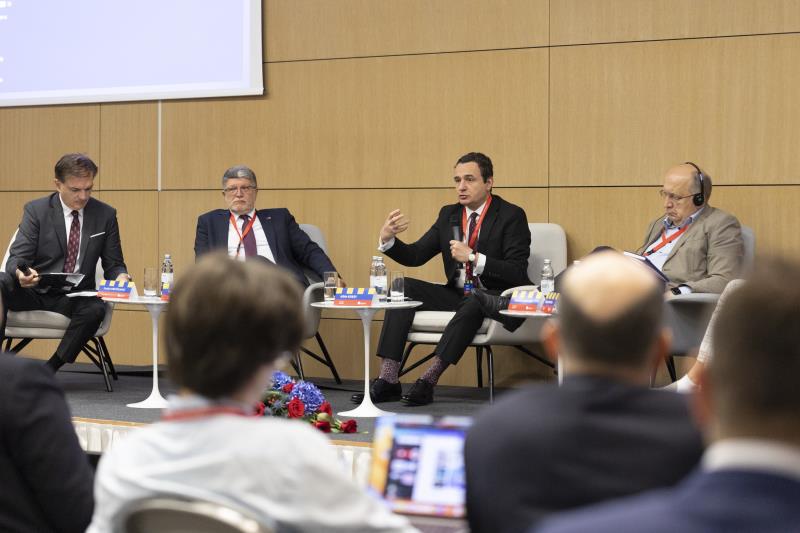
During the panel discussion "Croatian Soft Power: From Case to Systematic Approach," the speakers were Branko Roglić, the CEO of the Orbico Group, Prof. Sven Marcelić from the Faculty of Philosophy in Zadar, and Jan deJong, the president of the Croatian Association of Digital Nomads. At the outset, Marcelić optimistically pointed out that today's low level of trust in Croatian institutions means that there is great potential for progress ahead of us, and deJong agreed with him, who said that in Croatia we have the best lifestyle in Europe, and that we have great opportunities for growth in tourism, the IT sector, and agriculture. In the EU today, young people in general have far more opportunities than his generation had, said Branko Roglić, but we still have the right to be critical of the state, because the biggest problems in Croatia are still corruption, excessive bureaucratization and ineffective justice. DeJong emphasised that Croatia today is certainly not the same country as it was 15 years ago. It has made progress in many areas, but there is still a significant number of people living in poverty, paycheck to paycheck, while certain sectors such as IT are thriving and making significant international strides. Marcelić stated that Croatia is a better member of the EU and emphasised the importance of rebuilding Croatian society for our future.
